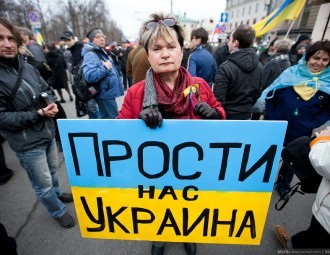Moscow's peace march was a rally against war, and an assertion of a tacit middle-class war with Krem

With all the government propaganda and the polls citing overwhelming support for Kremlin and its actions, a thousands-strong protest march becomes the only dialogue with the government.
Imagine this: in a rigidly authoritarian society, with a state increasingly clamping down hard on dissent and free speech, tens of thousands of people, maybe up to 50,000, march through their country's capital, denouncing their government and calling their authoritarian leader indecent names. Then they quietly disperse and go back to their lives.
The authoritarian paradox
There is a paradox in that picture, and yet it is exactly what happened in Moscow on Sunday during the March for Peace against war in Ukraine, which was authorised by the city government.
Pro-Kremlin pundits and propagandists would spin such a paradox so as to claim that Russia is actually not an authoritarian state, and that it gives its dissenters far more freedom than they deserve. The reality is quite the opposite: a thousands-strong protest march happens – and is allowed to happen – precisely because Russia has become as authoritarian as it is.
In that context, Sunday's march against Russia's involvement in Ukraine acts as both a check against the increasing cycle of repression that Russia is currently undergoing, and a reflection of a more repressive status quo.
Optimistically speaking, the government pays very close attention to these protest marches, and, in some cases, even limits its actions against them. In the winter of 2011-2012, it even made small concessions to protesters' demands. More recently, the sudden release of opposition leader Aleksei Navalny from prison in July 2013 has been widely attributed to a spontaneous, massive demonstration in his support.

Representatives of the 'Russian Anti-militarist Movement.' (c) Anna Arutunyan
Moreover, given the ubiquitous buzzing of a helicopter hovering over Sunday's march, the Kremlin could not have failed to notice that while only about a thousand people turned up to a spate of demonstrations calling for support of the pro-Russia rebels in Ukraine over the summer, tens of thousands turned up to a rally denouncing Russia's involvement in Ukraine. The march showed the Kremlin that, while it can rely on an abundance of passive support, its active supporters are significantly outnumbered by active opponents.
For and against
But there is also a darker side to how this march will be used by the state to bolster propaganda and to further divide society. The first thing greeting a visitor to the march was a dozens-strong picket, shouting ‘Donbas, forgive us for our traitors.’ They denounced the peace march as ‘a march for genocide.’
‘This is a profanation of what is happening in Ukraine,’ said Dmitry Pryannishnikov, an activist who greeted marchers with a pro-Donbas banner. ‘Peaceful civilians [in Ukraine] are being bombed by artillery and ballistic missiles. This is madness. Instead of political dialogue they are using ballistic missiles. How do you understand that?’
Further down Strastnoi Boulevard, dozens of people shouting about a traitor's march were kept at bay by a cordon of riot police.
And while the march itself consisted largely of the middle-class urban intelligentsia that provided the backbone of the Bolotnaya Square protests of 2012, it also had more radical elements, like the nationalist People's Will, with their black flags. There were also sympathisers with some of the more radical elements in Ukraine. One demonstrator brandished a NATO flag. And there was an abundance of Ukrainian flags.
As a result, Sunday's march looked more like a demonstration of support for Ukraine rather than a march for peace, with declamations of ‘Hands off of Ukraine!’ Other groups, like those specifically targeting the problem of Russian soldiers dying in Ukraine, were drowned out by louder voices.
On the other side of the barricades, away from the supporters of Novorussia, one peace marcher cried out, ‘Everyone knows all the normal people are for peace!’ Echoing, unwittingly, the cry from the other side.

Counter-demonstrators, held back by a police cordon, hold flags of 'Novorussia.' (c) Anna Arutuyan
This is not, by any means, a criticism of the march's organisers or the march itself, which, given the lack of alternatives, and tightening noose around the media, provided one of the few major platforms for various grievances against the government.
Fault lines
But such a march is a demonstration of a growing problem in which dissenters are inadvertently providing fodder for state propaganda; and are being pushed to take more extreme positions. To criticize Russia's role in stoking a conflict that has claimed over 3,000 lives is to be labeled a traitor. To raise concerns that the Ukrainian government has killed thousands of civilians while trying to rein in the rebellion is to be labeled a Kremlin appeaser or a useful idiot. The divisions are already stark – and it is in the Kremlin's interests to make them deeper.
Responding to the freedom march, journalist Oleg Kashin, who took an active role in the Bolotnaya protests two years ago, put it this way: ‘People are walking down the boulevard, the police are protecting them, and then state television will say something disgusting about them. Turns out, a social contract can be like this, too.’
Given the extent of government propaganda and the accusations of treason, with the polls citing overwhelming (if passive) support for the Kremlin and its actions, a thousands-strong protest march becomes the only dialogue with the government.
One demonstrator – possibly the only one not to have taken a side – brandished a sign that said, ‘Democracy is the source of corruption.’ When asked why he attended rallies if he believed democracy was bad, he said that they weren't a manifestation of democracy, but a demonstration of the people's will.
In the hybrid autocracy that is Russia, he may have a point.
-
03.01
-
07.10
-
22.09
-
17.08
-
12.08
-
30.09










































